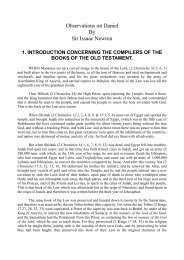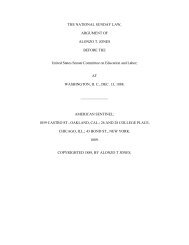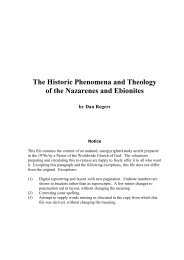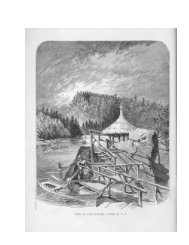THE EARLY CHRISTIAN SABBATH - Friends of the Sabbath Australia
THE EARLY CHRISTIAN SABBATH - Friends of the Sabbath Australia
THE EARLY CHRISTIAN SABBATH - Friends of the Sabbath Australia
You also want an ePaper? Increase the reach of your titles
YUMPU automatically turns print PDFs into web optimized ePapers that Google loves.
The Early Christian <strong>Sabbath</strong><br />
statements, we must remember that <strong>the</strong>se testimonies from <strong>the</strong> early centuries are from<br />
men who <strong>the</strong>mselves were Sunday keepers. They were not at all interested in<br />
emphasizing <strong>Sabbath</strong> observance. They took Sunday keeping for granted, and only<br />
casually mentioned that <strong>the</strong> seventh day <strong>Sabbath</strong> was being observed. Their testimony is<br />
<strong>the</strong>refore so much <strong>the</strong> more valuable.<br />
We have already read from Justin Martyr his statement, <strong>the</strong> earliest we have in <strong>the</strong><br />
Fa<strong>the</strong>rs, concerning Sunday keeping, that on <strong>the</strong> “day <strong>of</strong> <strong>the</strong> sun” Christians had religious<br />
worship. In this testimony addressed to <strong>the</strong> emperor, he carefully avoided mentioning <strong>the</strong><br />
fact that any Christians were keeping <strong>the</strong> <strong>Sabbath</strong>. This is doubtless because he did not<br />
wish <strong>the</strong> emperor to make too close an identification <strong>of</strong> Christians- with <strong>the</strong> hated Jews.<br />
But Justin Martyr, a Syrian writing in Rome, did recognize that Christians were<br />
keeping <strong>the</strong> <strong>Sabbath</strong>, when writing against a Jew by <strong>the</strong> name <strong>of</strong> Trypho who had<br />
attacked <strong>the</strong> Christians. Justin did not like <strong>the</strong> Jews. He did not like Trypho. He did not<br />
like <strong>Sabbath</strong> keeping. But in chapter 47 <strong>of</strong> his Dialogue With Trypho, a Jew, Justin tried<br />
to be “broadminded” in his attitude toward Christian <strong>Sabbath</strong> keepers. He made this<br />
concession: 1 hold that we ought to join ourselves to such [<strong>Sabbath</strong> keepers], and<br />
associate with <strong>the</strong>m in all things as kinsmen and brethren.” - The Ante-Nicene Fa<strong>the</strong>rs,<br />
volume 1, page 218. Because this is so grudging a testimony to Christian <strong>Sabbath</strong><br />
keeping, it is <strong>the</strong> more conclusive.<br />
We will now consider ano<strong>the</strong>r witness in <strong>the</strong> West, who was under influences<br />
similar to those which led <strong>the</strong> Church <strong>of</strong> Rome .to attempt to destroy <strong>Sabbath</strong> keeping.<br />
Tertullian was a noted Christian writer <strong>of</strong> North Africa. He died about AD 235. He was<br />
deeply interested in Sunday keeping, and held that Sunday should be kept as a day <strong>of</strong> joy<br />
in commemoration <strong>of</strong> <strong>the</strong> happy event <strong>of</strong> Christ's resurrection. It was his wish that <strong>the</strong>re<br />
be no fasting, or any kneeling in prayer, on Sunday. He was displeased to find <strong>Sabbath</strong><br />
keeping Christians insisting that <strong>the</strong>y should not have to kneel in prayer on <strong>the</strong> <strong>Sabbath</strong><br />
day. Here is what he wrote in his essay On Prayer, chapter 23:<br />
“In <strong>the</strong> matter <strong>of</strong> kneeling also prayer is subject to diversity <strong>of</strong> observance,<br />
through <strong>the</strong> act <strong>of</strong> some few who abstain from kneeling on <strong>the</strong> <strong>Sabbath</strong>. And since this<br />
dissension is particularly on its trial before <strong>the</strong> churches, <strong>the</strong> Lord will give His grace that<br />
<strong>the</strong> dissentients may ei<strong>the</strong>r yield, or else indulge <strong>the</strong>ir opinion without <strong>of</strong>fense to o<strong>the</strong>rs.”<br />
- The Ante-Nicene Fa<strong>the</strong>rs, Vol. 3, p. 689.<br />
With a great effort Tertullian sought to be considerate toward <strong>the</strong> <strong>Sabbath</strong> keepers<br />
who desired <strong>the</strong> <strong>Sabbath</strong> to be a day <strong>of</strong> joyful, unhampered worship. He said that, out <strong>of</strong><br />
consideration for o<strong>the</strong>rs, <strong>the</strong>y should kneel in public prayer on <strong>the</strong> <strong>Sabbath</strong>, as <strong>the</strong> Sunday<br />
keeping Christians were doing. He made it plain that Sunday keeping Christians were not<br />
kneeling on Sunday, but it is equally plain that <strong>the</strong> Sunday keepers were going to <strong>the</strong><br />
churches and kneeling in worship on <strong>the</strong> <strong>Sabbath</strong>. Virtually all Christians, it is evident,<br />
were worshiping, one way or ano<strong>the</strong>r, on <strong>the</strong> <strong>Sabbath</strong> day.<br />
A contemporary <strong>of</strong> Tertullian, a teacher <strong>of</strong> Alexandria named Origen, though<br />
himself a Sunday keeper, is in no doubt as to <strong>the</strong> virtue <strong>of</strong> <strong>Sabbath</strong> observance, and tells<br />
just how Christians should observe it. He meant to place this observance <strong>of</strong> <strong>the</strong> seventh<br />
day by Christians in contrast to Jewish practices, when he said:<br />
“After <strong>the</strong> festival <strong>of</strong> <strong>the</strong> unceasing sacrifice [<strong>the</strong> crucifixion] is put <strong>the</strong> second<br />
festival <strong>of</strong> <strong>the</strong> <strong>Sabbath</strong>, and it is fitting for whoever is righteous among <strong>the</strong> saints to keep<br />
also <strong>the</strong> festival <strong>of</strong> <strong>the</strong> <strong>Sabbath</strong>. Which is, indeed, <strong>the</strong> festival <strong>of</strong> <strong>the</strong> <strong>Sabbath</strong>, except that<br />
46

















